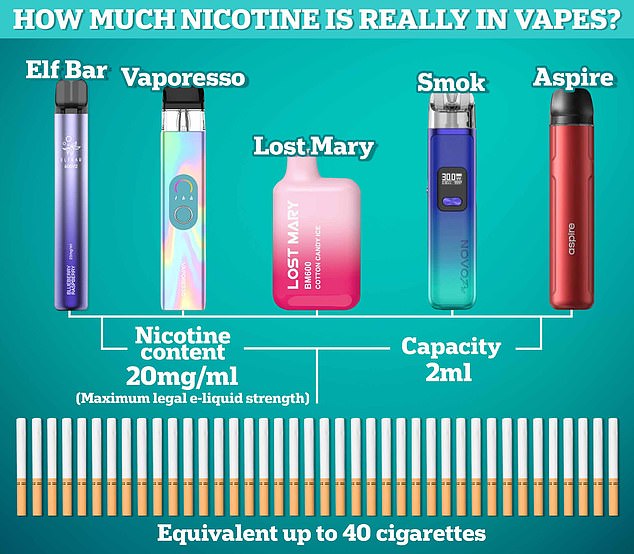- EXPLORE FURTHER: Vaping Found More Hazardous Than Smoking In Groundbreaking Study Reveals
The disposable vape ban imposed today could backfire, putting hundreds of thousands at risk of dementia, heart disease and organ failure, a new study has suggested.
Based on a study encompassing 750 individuals from the United Kingdom, 42 percent of e-cigarette users would contemplate going back to smoking traditional cigarettes if vaping products were entirely prohibited.
More than 25% of the participants stated that they do not intend to alter their vaping behaviors, despite the restrictions on disposable vapes.
On this day, 1st July 2025, stores and enterprises have ceased selling single-use e-cigarettes as part of an effort to prevent youth from adopting this detrimental practice.
Violating this prohibition might lead to several consequences throughout the UK, with fines starting at a minimum of £200 for companies selling disposable vapes in England. Those who repeatedly break the rule can be sentenced to as much as two years in jail.
Trading Standards will likewise have the authority to confiscate any single-use vaping devices they come across.
However, research funded by Vape Shop indicates that this step might jeopardize the government's efforts to achieve a smoke-free Britain.
Approximately 5 million disposable vape devices are discarded weekly in the UK.

The latest survey indicates that 44 percent of e-cigarette users reported they initially began vaping as an aid to stop smoking.
Out of the 750 vape users polled, 27 percent stated their intention to keep vaping even after the ban comes into effect, while 52 percent reported already utilizing refillable and rechargeable devices.
Chris Price, who serves as the E-Commerce Manager at Vape Shop said: 'These findings show a real risk that following the disposable ban, we may see thousands pushed back to smoking—the very habit vaping helped them quit.
'In line with the 2030 smoke-free target, it’s crucial that our policies do not hinder the advancements achieved over the past ten years,' he emphasized.
The survey follows as modeling shows study A study conducted by the Future Health Research Centre revealed that although the ban might lead to approximately 378,000 individuals quitting vaping, it could also cause cigarette smoking rates to soar dramatically.
The simulation suggested that the number of new smokers might range from 90,000 to 200,000 after the implementation of the ban.
Richard Slogget, who authored the report and previously served as an adviser to the government, stated: "The Government has taken commendable and robust steps to decrease smoking rates and address youth e-cigarette use."

These results indicate that immediate action is necessary to guarantee that initiatives aimed at decreasing youth vaping do not inadvertently lead to an increase in cigarette smoking rates, especially among young individuals.
This prohibition seems like a lost chance, as hundreds of thousands of individuals will likely seek substitutes for disposable vapes; however, more than half indicate they would merely shift to an alternative product instead.
As the ban approaches, the government must take proactive steps, pledge support for a nationwide anti-smoking media campaign, and provide clearer guidance on how they plan to utilize their upcoming regulatory authority under the Tobacco and Vapes Bill. This would aid in ensuring that individuals who currently use disposable vapes do not resort to cigarette smoking as an alternative.
According to Cancer Research UK, vaping is far less harmful than smoking.
This is because, according to the NHS, vaping exposes users to fewer toxins and at lower levels than smoking cigarettes.
Cigarette smoking has been associated with a minimum of 16 distinct forms of cancer along with multiple cardiovascular and pulmonary disorders, fertility issues, and numerous additional complications, resulting in more than eight million fatalities annually.
Analysis by the cancer charity found that on average, nearly 160 cancer cases attributed to smoking were diagnosed every day in 2023.
However, research presented by Manchester Metropolitan University earlier this year challenged this, suggesting vapes could pose a similar health threat.
Experts explain that this occurs due to e-cigarettes enabling individuals to breathe in nicotine in vapor form, created by warming a solution often comprising a blend of toxic substances and flavorings.
Specialists are worried that this elevated nicotine level raises heart rate and blood pressure similar to how it affects smokers, causing blood vessels to narrow and harming arterial walls.
In the research conducted in Manchester, scientists monitored participants with an average age of 27 who were all at a comparable fitness level.
Regular stress tests were conducted on them to assess the flexibility of their blood vessels and the velocity of blood reaching their brains.
Both smokers and vapers showed a steady measurement, indicating their arterial walls were harmed and could not expand anymore—a strong indication of potential severe heart issues in the near future, according to the researchers.
Additional examinations showed that both smokers and vapers experience a similar impairment in blood circulation, which puts them at risk for cognitive issues such as dementia.
Last year, MailOnline revealed that the count of negative side effects associated with vaping, reported to UK regulators, surpassed 1,000, including five fatalities.
As stated by the World Health Organization (WHO), over 8 million individuals succumb to tobacco usage annually.
Read more
Komentar
Posting Komentar